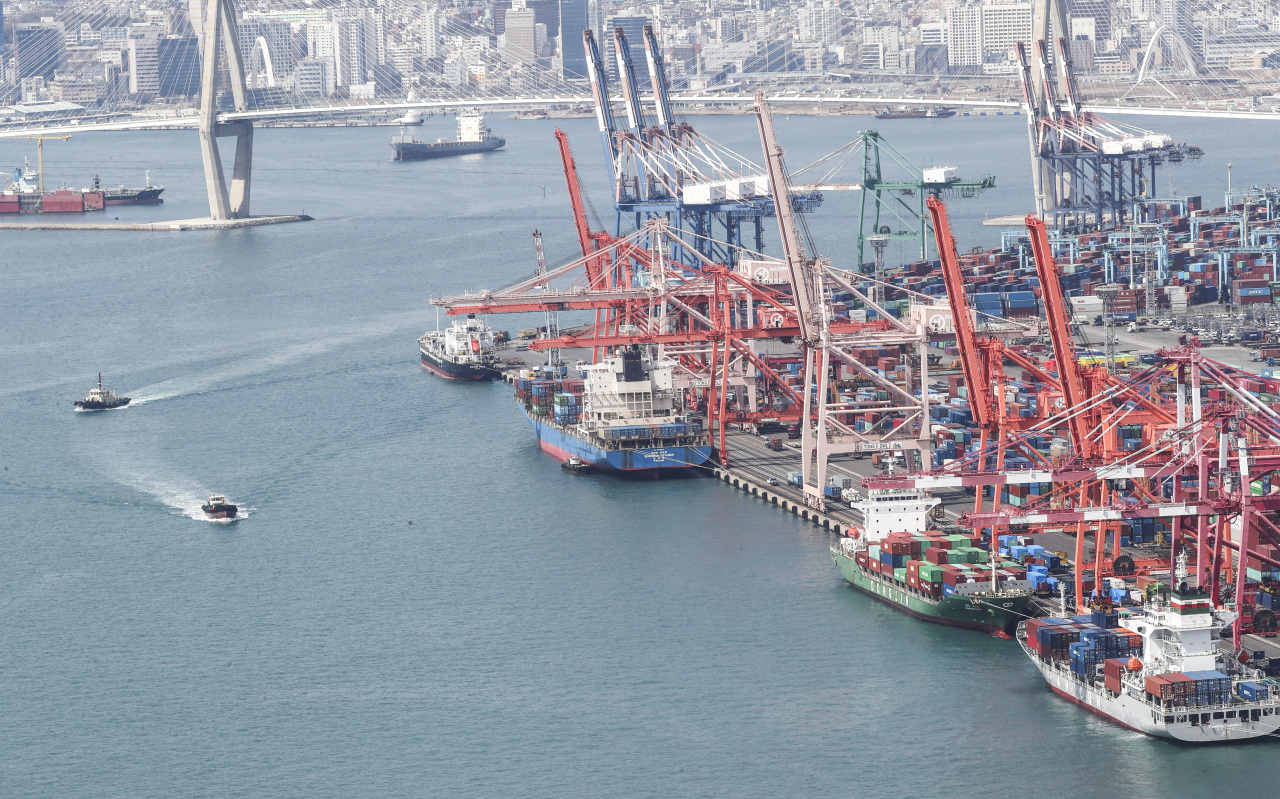Korea’s industrial output declines for 2nd consecutive month
By Kim Yon-sePublished : March 31, 2022 - 17:35

SEJONG -- Korea’s industrial output declined for the second consecutive month in the wake of a glitch in imports of raw materials as well as the spread of the omicron variant of the coronavirus, state data showed Thursday.
According to Statistics Korea, industrial output decreased by 0.2 percent in February, compared to the previous month. It posted a 0.3 percent drop in January.
This marked the first time in 21 months dating to May 2020 that industrial output fell for two consecutive months.
As a noteworthy case, output in the construction sector plunged by 8.5 percent in February. This was mainly attributed to the situation that local builders had difficulty in securing construction materials amid a spike in raw materials in the international market, officials said.
Prices of building materials, such as cement, steel and bricks, have surged on sharply growing demand amid global business normalization in the middle of the ongoing pandemic. Further, it has been found that spiraling crude prices added the cost burden of local builders.
As another core factor, the upsurge in the omicron variant has brought about a 0.3 percent fall in output in the service sector.
Lodging and food services saw their output decline by 4 percent on-month, with the arts, sports and leisure services recording a fall of 7.3 percent, as more people reduced their outdoor activities.
In contrast, output in the manufacturing sector increased by 0.5 percent on the back of a robust production of semiconductors and electronic parts.
Retail sales inched up only 0.1 percent despite hopes for economic recovery. Sales of food and beverages fell by 4.4 percent with those of semi-durable goods such as shoes and bags falling 0.6 percent, while sales of durable goods involving passenger cars gained by 9.4 percent.
Deputy Prime Minister and Finance Minister Hong Nam-ki, in his written statement, said that “the recovery in domestic demand has been restricted due to spread of the omicron variant.” But he said performances in exports and manufacturing were still brisk.
Though Hong predicted “a bounce back in private consumption when the virus would be under control via its peak,” he has raised concerns over external risks including Russia’s invasion of Ukraine.
“Growing uncertainty surrounding the economy might be linked to a sagging business sentiment,” he said. “It is time to conduct full-fledged monitoring and countermeasures.”
He said the government would not spare any effort in undertaking possible methods in a bid to alleviate the burden to households and businesses amid the inflationary pressure from spikes in raw materials prices.
The market is pinning hopes on state-led additional countermeasures against rapidly increasing gasoline and diesel prices.
According to the Korea National Oil Corp., the price of the nation’s benchmark gasoline has surged to its highest point in about nine years, since early 2013, to reach 1,998.52 won ($1.65) per liter as of Thursday.
By Kim Yon-se (kys@heraldcorp.com)
According to Statistics Korea, industrial output decreased by 0.2 percent in February, compared to the previous month. It posted a 0.3 percent drop in January.
This marked the first time in 21 months dating to May 2020 that industrial output fell for two consecutive months.
As a noteworthy case, output in the construction sector plunged by 8.5 percent in February. This was mainly attributed to the situation that local builders had difficulty in securing construction materials amid a spike in raw materials in the international market, officials said.
Prices of building materials, such as cement, steel and bricks, have surged on sharply growing demand amid global business normalization in the middle of the ongoing pandemic. Further, it has been found that spiraling crude prices added the cost burden of local builders.
As another core factor, the upsurge in the omicron variant has brought about a 0.3 percent fall in output in the service sector.
Lodging and food services saw their output decline by 4 percent on-month, with the arts, sports and leisure services recording a fall of 7.3 percent, as more people reduced their outdoor activities.
In contrast, output in the manufacturing sector increased by 0.5 percent on the back of a robust production of semiconductors and electronic parts.
Retail sales inched up only 0.1 percent despite hopes for economic recovery. Sales of food and beverages fell by 4.4 percent with those of semi-durable goods such as shoes and bags falling 0.6 percent, while sales of durable goods involving passenger cars gained by 9.4 percent.
Deputy Prime Minister and Finance Minister Hong Nam-ki, in his written statement, said that “the recovery in domestic demand has been restricted due to spread of the omicron variant.” But he said performances in exports and manufacturing were still brisk.
Though Hong predicted “a bounce back in private consumption when the virus would be under control via its peak,” he has raised concerns over external risks including Russia’s invasion of Ukraine.
“Growing uncertainty surrounding the economy might be linked to a sagging business sentiment,” he said. “It is time to conduct full-fledged monitoring and countermeasures.”
He said the government would not spare any effort in undertaking possible methods in a bid to alleviate the burden to households and businesses amid the inflationary pressure from spikes in raw materials prices.
The market is pinning hopes on state-led additional countermeasures against rapidly increasing gasoline and diesel prices.
According to the Korea National Oil Corp., the price of the nation’s benchmark gasoline has surged to its highest point in about nine years, since early 2013, to reach 1,998.52 won ($1.65) per liter as of Thursday.
By Kim Yon-se (kys@heraldcorp.com)









![[Today’s K-pop] BTS pop-up event to come to Seoul](http://res.heraldm.com/phpwas/restmb_idxmake.php?idx=644&simg=/content/image/2024/04/17/20240417050734_0.jpg&u=)
![[Graphic News] More Koreans say they plan long-distance trips this year](http://res.heraldm.com/phpwas/restmb_idxmake.php?idx=644&simg=/content/image/2024/04/17/20240417050828_0.gif&u=)






![[KH Explains] Hyundai's full hybrid edge to pay off amid slow transition to pure EVs](http://res.heraldm.com/phpwas/restmb_idxmake.php?idx=652&simg=/content/image/2024/04/18/20240418050645_0.jpg&u=20240419100350)

